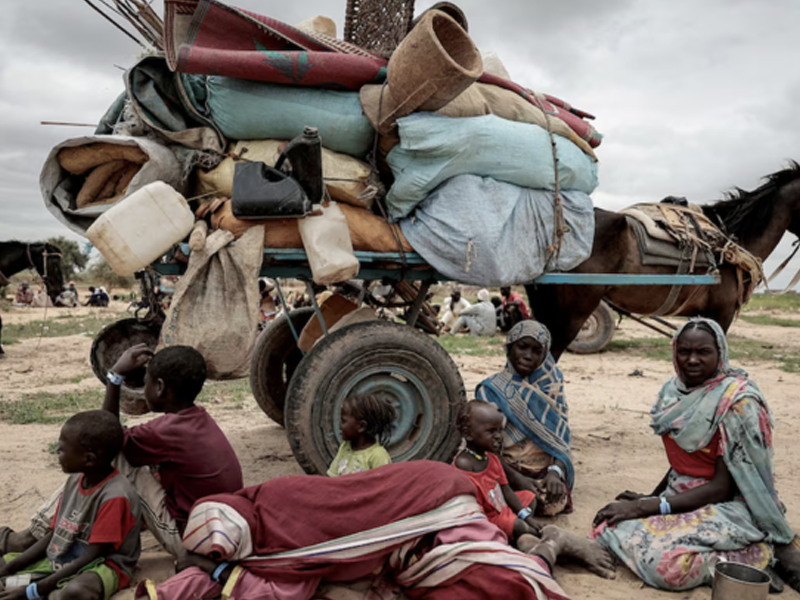Sudan war’s humanitarian cost demands a collective response

- 122
- 0
The humanitarian crisis gripping Sudan has surged to unprecedented levels, drawing urgent appeals for help from aid organizations and top UN officials alike. This crisis, labeled as one of the gravest humanitarian catastrophes in recent memory, has catapulted Sudan into a nightmarish scenario — and it has the potential to reverberate across the region, triggering a hunger and famine crisis of unparalleled proportions.
Unfortunately, the power struggle between the Sudanese Armed Forces and the Rapid Support Forces militia continues to take a devastating toll, leaving a trail of destruction and despair in its wake. Reports of appalling violence and atrocities perpetrated against civilians, including brutal killings and acts of rape, serve as grim reminders of the human cost of war. The harrowing testimonies of survivors paint a chilling portrait of the horrors endured by those caught in the crossfire. Families torn apart, communities shattered and futures extinguished; the toll of this conflict is immeasurable, leaving behind scars that may never fully heal.
As famine looms ominously over Sudan, urgent international action is required to mitigate the suffering and prevent any further escalation of the crisis. The specter of mass starvation looms large, casting a dark shadow over Sudan’s already precarious humanitarian landscape. Amid the chaos and despair, humanitarian aid access remains severely restricted, exacerbating the plight of vulnerable populations.
The conflict has ravaged Sudan’s fragile public infrastructure, including its healthcare system, exacerbating the strain on essential services such as basic healthcare, water, sanitation and hygiene. Hospitals and medical facilities, which once offered hope for the sick and injured, now stand as mere shells, unable to cope with the overwhelming influx of patients. The displacement of civilians has placed an additional strain on stretched resources, further exacerbating the humanitarian crisis.
In turn, the ripple effects of Sudan’s crisis have been felt far beyond its borders, casting a long shadow over the stability and prosperity of the entire region. The influx of refugees fleeing violence and persecution has placed immense strain on neighboring countries, overwhelming their capacity to provide humanitarian assistance and support. Countries such as Ethiopia, Chad and South Sudan, already grappling with their own internal challenges, have been forced to contend with the additional burden of hosting displaced Sudanese populations. This sudden influx of refugees has stretched limited resources to breaking point, escalating social tensions and economic disparities within host communities.
Looking ahead, the situation is expected to deteriorate further, with the increasing violence driving additional displacement and heightening risks across the region. The protracted nature of the conflict, compounded by political stalemates and competing interests, threatens to plunge Sudan into a state of perpetual instability, with far-reaching implications for regional security and stability.
In the face of such daunting challenges, a comprehensive and sustainable solution is urgently required to address the crisis and alleviate the suffering of millions of Sudanese civilians. Sponsored mediation efforts, backed by the UN and the African Union, offer a glimmer of hope in an otherwise bleak landscape. The recent talks led by Saudi Arabia and the US in Jeddah aimed at brokering a truce between Sudan's army and the paramilitary RSF also represented a step in the right direction.
However, sustained diplomatic engagement and multilateral cooperation are essential to build trust between the warring parties and pave the way for a durable peace agreement. The involvement of regional and international actors is also crucial in supporting efforts to promote dialogue, reconciliation and national unity in Sudan.
In addition to diplomatic initiatives, it is critical to prioritize the protection of civilians and ensure unhindered humanitarian access to affected populations. International actors must exert pressure on all the parties to adhere to international humanitarian law and respect the rights of civilians. Furthermore, sustained funding and investment in humanitarian assistance and development programs is essential to address the immediate needs of vulnerable communities.
As Abdullah Al-Rabeeah, the supervisor general of the Saudi aid agency KSrelief, correctly pointed out: “Finding solutions for the humanitarian crisis in Sudan includes securing full and safe access for aid and workers, increasing international funding, and supporting sustainable peace initiatives. Millions of refugees and (internally displaced persons) are in need of urgent emergency assistance in Sudan and in neighboring countries, and host countries also need our support to care for the influx of those fleeing from the violence. With every day that passes, more and more people are at risk but, working together, we can make a positive difference in the lives of Sudan’s most vulnerable. It is our shared responsibility to do everything we can to alleviate suffering and work towards peace and stability in Sudan.”
In a nutshell, the crisis in Sudan demands a sustained and coordinated effort by the international community and regional and local actors. By galvanizing political will, mobilizing resources and prioritizing the needs of affected populations, the international community can work toward a future where the people of Sudan can live in peace, security and dignity. The stakes are too high to ignore — the lives and futures of millions of Sudanese civilians hang in the balance. Now is the time for decisive action, before more lives are lost and irreparable damage is done. Courtessy by Ara News
Published in The Daily National Courier, April, 02 2024
Like Business on Facebook, follow @DailyNCourier on Twitter to stay informed and join in the conversation.

















































